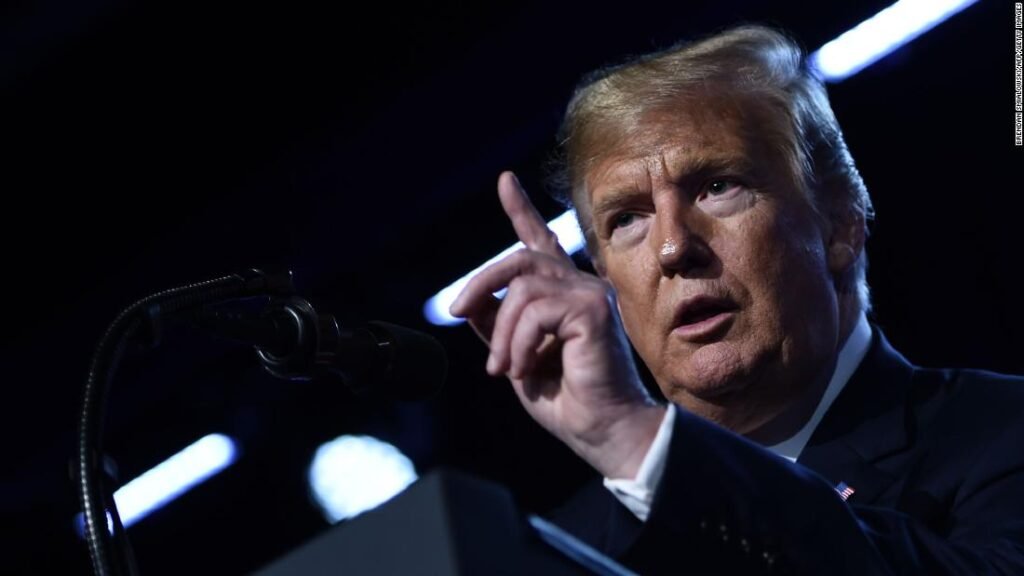the realm of the latest breaking news, the political landscape is ablaze with discussions surrounding the potential removal of former President Donald Trump from the 2024 ballot. Today’s news brings attention to the statements made by some of Trump’s rivals within the Republican Party, with a range of opinions emerging on whether he should be allowed to run for president again. This development has triggered a nuanced political debate, revealing the delicate balancing act that many GOP figures are attempting as they navigate the complex dynamics of Trump’s influence.
To provide insights and analysis on this matter, we turn to political experts, including Basil Smikle, former Executive Director of the New York State Democratic Party, former Republican Congressman Adam Kinzinger, and David Axelrod, former Senior Adviser to President Obama. Their perspectives shed light on the multifaceted considerations at play in this unfolding political drama.
Congressman Kinzinger, who served on the January 6 Select Committee, offers an initial analysis. He notes the predicament faced by Trump’s rivals within the GOP, emphasizing the delicate political tightrope they must walk. The congressman acknowledges that while some may genuinely hold principled positions, others may be motivated by political expediency. The overarching sentiment is that directly opposing Trump’s candidacy could be perceived as a weak move, potentially alienating the base crucial for any successful Republican candidate.

The debate gains momentum with insights from David Axelrod, who delves into the intricacies of Trump’s political strategy. Axelrod suggests that Trump’s candidacy has, in part, served as a legal defense strategy, anticipating potential indictments. The narrative of victimhood and unfair targeting by the justice system has become a central theme for Trump, and Axelrod notes that the GOP rivals’ statements on supporting Trump in this legal battle may inadvertently contribute to this narrative. This dynamic raises concerns about the erosion of norms and the lasting impact on the political landscape.
Basil Smikle adds to the discussion by emphasizing the role of Trump’s rivals as unwitting surrogates for the former president. By voicing support for Trump’s legal battle to remain on the ballot, these GOP figures unintentionally align themselves with Trump’s narrative of being persecuted for the sake of his supporters. Smikle notes that this not only strengthens Trump’s position within the Republican Party but also reinforces the image of him as a champion against a perceived unjust system.
The conversation takes a turn towards potential repercussions, as concerns are raised about the potential precedent set by such political maneuvering. The worry expressed is that if Trump’s rivals align themselves too closely with him, it may embolden similar actions in the future, with states attempting to keep candidates from opposing parties off the ballot based on legal or political considerations.
As the dialogue unfolds, the spotlight shifts to the issue of potential pardons. Nikki Haley and Ron DeSantis, two prominent Republicans, have suggested that they would consider pardoning Trump if elected. Congressman Kinzinger expresses his disapproval, questioning the motivations behind such statements. He emphasizes the need for candidates to refrain from making premature commitments without a full understanding of the evidence and circumstances.
Basil Smikle echoes this sentiment, highlighting the inconsistency in candidates simultaneously asserting Trump’s unfair treatment while contemplating pardons. The lack of differentiation between themselves and Trump on this matter raises questions about their distinctiveness as candidates and their commitment to accountability.
David Axelrod, while recognizing the political expediency behind such statements, underscores the potential consequences of pardoning Trump. He raises concerns about the accountability for Trump’s actions, emphasizing the need for a thorough examination of evidence and a commitment to the rule of law. The debate surrounding potential pardons adds another layer of complexity to the broader discussion on Trump’s political future.
In conclusion, the latest breaking news regarding Trump’s potential removal from the 2024 ballot has ignited a multifaceted political debate within the GOP. The delicate dance performed by Trump’s rivals reflects the challenging dynamics of navigating his influence within the party. The unintentional alignment with Trump’s narrative and the consideration of potential pardons raise questions about the long-term impact on political norms and accountability. As the story continues to unfold, the nation watches closely, recognizing the implications for the upcoming election and the broader landscape of American politics.
